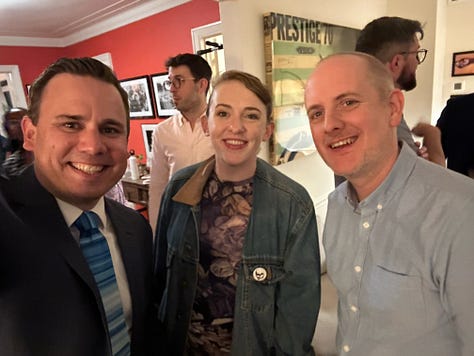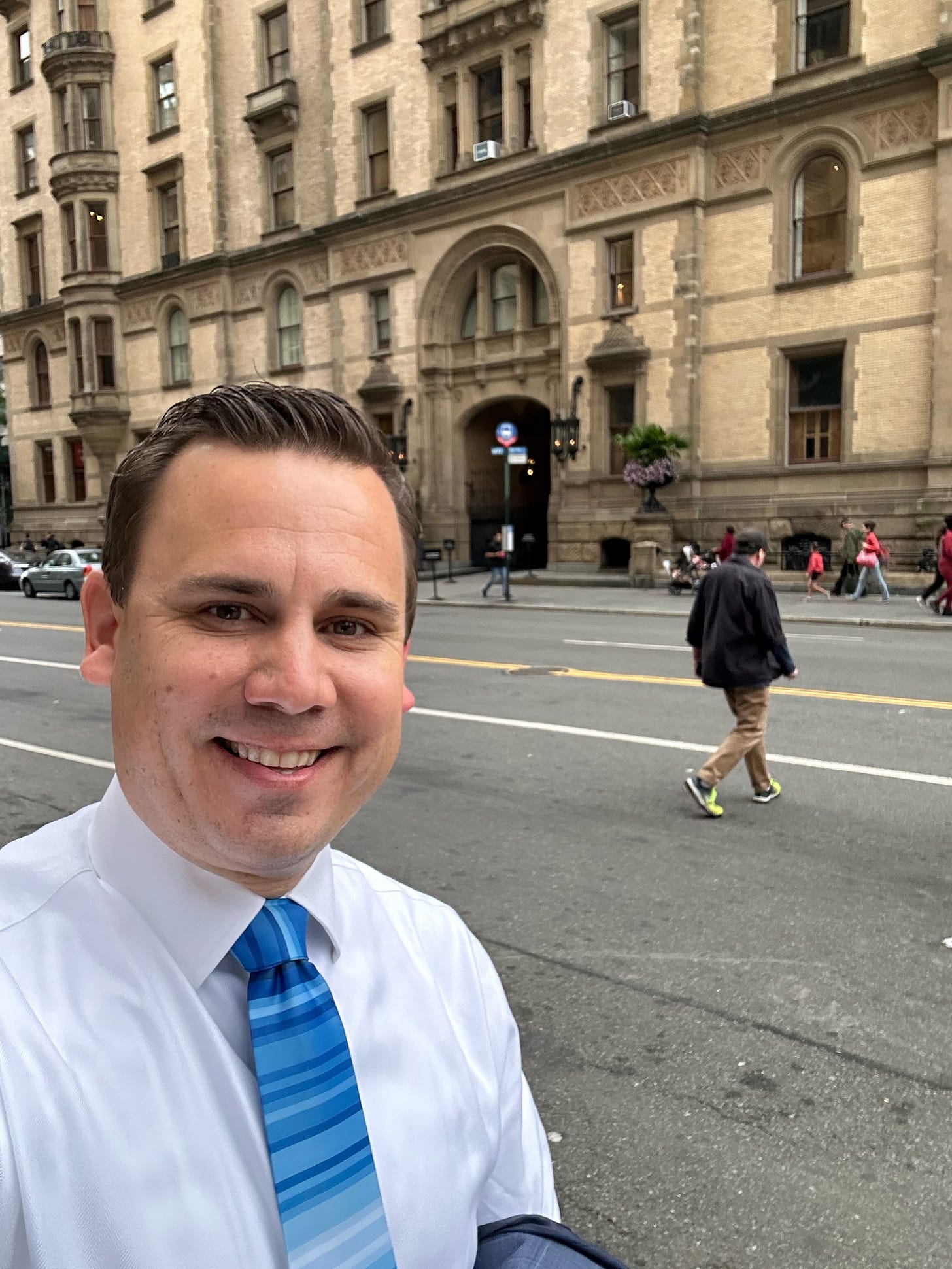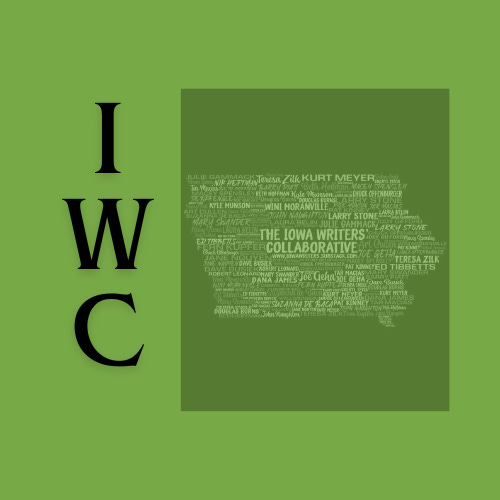This week, I spent several days in New York City attending Climate Week. The week intentionally coincides with the UN session, which means New York City is crazier than normal. I think there is a lot of good will, but I am skeptical of meaningful climate action. From my perspective there were a lot of organizations patting themselves on the back.
My full-time employer allowed me to attend, but I paid my own way. It’s been a difficult year adjusting to a new industry. My employer pays what you would expect to pay someone who would hold my title and position. I laugh at skeptics who say *climate* is big money. Please don’t see this as a call for accolades, but changing careers resulted in a high 5-figure salary cut. I did this because there isn’t a more pressing issue that we humans are dealing with.
I spent the week in my childhood bedroom on eastern Long Island. My routine was to wake up, spend 3 hours on the bus heading into the City and then spend the entire day “climating.” On Tuesday, an older man struck up a conversation as we waited for the bus. He looked familiar, and I kept an ear open for when he gave his last name to the bus attendant. Between lip reading and making out some of what he said, I was able to google Garber. Low and behold, it was actor Victor Garber.
This was a moment where I was proud to walk the walk and talk the talk. He noticed my climate stripes tie and asked about it. It was the perfect opportunity to talk about climate change. Talking is one climate action that we can all do, because it doesn’t cost a penny.
I spent so much time talking about climate change this week, that I nearly lost my voice. First, let’s chat about climate week, and then I’ll tell you about how I was involved.
What is Climate Week NYC? A Global Call to Action
Each year, as world leaders gather in New York City for the UN General Assembly, another equally significant event takes place—Climate Week NYC, launched in 2009 by The Climate Group, Climate Week has grown to become one of the largest platforms for global climate action. It brings together leaders from government, business, science, and civil society to strategize solutions for one of the most pressing challenges of our time: climate change.
Why Climate Week Matters
The main focus of Climate Week is on transitioning to a sustainable, low-carbon future. Every September, New York City becomes a hub of dialogue and action, with discussions covering key sectors like energy, transportation, food systems, and finance—each of which plays a critical role in reducing emissions and building resilience.
However, this is more than just a forum for debate. It's a stage where real commitments and solutions are shared, often setting the tone for global climate efforts in the months that follow.
Who Attends?
The event draws some of the biggest names in climate action. Past speakers and participants include activists like Greta Thunberg, climate advocates such as Al Gore, and key voices in global diplomacy like UN Secretary-General António Guterres. But it’s not just about high-profile names—what makes Climate Week so impactful is its ability to bring together a diverse range of voices, from grassroots movements to corporate executives.
A Wide Range of Events
The diversity of programming during Climate Week is what makes it truly unique. While flagship events like "The Hub" provide a space for high-level policy discussions and corporate announcements, there are also hundreds of smaller events scattered across the city. These range from public exhibitions, to film screenings, to art installations, to educational workshops and lectures aimed at engaging the public.
Each year’s agenda evolves, but the overarching goal remains the same: to drive collective action on climate change.
The Push for Climate Justice
In recent years, Climate Week has increasingly focused on climate justice. The disproportionate impact of climate change on vulnerable communities—especially in the Global South and underserved urban areas—has become a central theme. As leaders work to develop strategies for a sustainable future, the call for equity and justice in climate solutions has grown louder, and this topic is now a key part of the Climate Week dialogue.
Corporate Responsibility and Commitments
Businesses play a pivotal role in Climate Week NYC. Many companies use the platform to announce major sustainability initiatives, from pledges to reduce carbon emissions to the development of new clean technologies. These corporate commitments can have a significant ripple effect, inspiring other businesses to follow suit and driving momentum in the private sector.
Looking Ahead
Climate Week NYC serves as a critical moment in the global climate calendar. It’s a time for reflection, innovation, and accountability—a chance for leaders to not only share their progress but also to push themselves, and others, to do more. As the climate crisis intensifies, events like these are essential for building a path forward, rooted in action and collaboration.
Climate Defiance
If you read my profile in the New York Times, you may have read about my ‘Iowa Dad,’ who has become a wonderful, lifelong friend. Channing splurged on a ticket to the Climate Defiance event. He paid, and I got to attend. It was terrific learning about their organization.



They are a youth-led climate activist group which has gained attention for its bold, direct actions aimed at demanding urgent climate action. Known for organizing protests, sit-ins, and other forms of civil disobedience, the group targets politicians and institutions which they believe are blocking meaningful progress on climate policy. Their approach is rooted in the belief that the climate crisis requires immediate, large-scale changes, and they’re willing to disrupt the status quo to make that happen. Climate Defiance has rapidly become a prominent voice in the climate justice movement, emphasizing the need for equity, accountability, and swift action in addressing the climate emergency.
Their civil disobedience often leads their members to getting cuffed, and they had been released from an overnight in jail for their disruptive protesting. I enjoyed the opportunity to meet their leaders, and I also was able to meet one of my climate heroes – Peter Kalmus.
So You Think You Can Science?
At the Futerra Solutions House, I had the unique opportunity to judge the game show, “So You Think You Can Science,” alongside Heather McTeer Toney. The show brought comedians and climate science together in a way I’ve never seen before. As a meteorologist, I was tasked with explaining the science behind their jokes. From discussing the impact of fossil fuels and methane emissions to extreme weather patterns, I helped break down the science while keeping the tone lighthearted.



The comedians—Pratima Mani, Emmy Blotnick, and Sean O’Connor—brought their A-game, turning serious climate graphics into hilarious interpretations. They attempted to “science” their way through climate topics like the hockey stick graph (which tracks rising temperatures), sustainable buildings, and even electric big rigs. While their answers were comedic, Heather and I followed up with real explanations to ensure the audience walked away with new knowledge.
What made this event stand out to me was how seamlessly it blended humor with science. I often speak about climate change in serious settings, but this event reminded me that engaging people in different ways can be incredibly powerful. People may not always tune in for a lecture, but they will for a comedy show. And in between laughs, they might learn something that sticks.
One of the highlights was tackling questions about extreme weather and renewable energy, topics which I cover frequently in my weather reports. It felt great to explain how global warming is making extreme events worse, and how renewable energy, like wind and solar, is a critical part of the solution.
Ultimately, the show was an example of how we can make climate education both fun and impactful. As someone who’s faced resistance (including death threats) for discussing climate change, it was refreshing to engage with the topic in such a positive, creative environment. Humor opens doors, and if it gets people to think critically about climate science, I’m all for it.
I left the event inspired to continue finding new ways to communicate the urgency of climate action—either through shows like this, weather reports, or public discussions. There’s no single approach, but there are endless possibilities to engage people.
This was all made possible by the super, amazing team at Adam McKay’s non-profit Yellow Dot Studios.
I am happy to be part of the Iowa Writer’s Collaborative! Please subscribe to other contributors!






Sounds like an interesting and challenging week. Thanks for sharing. With one of the largest hurricanes in history about to hit several states and the number of horrific tornados we've seen the last few years, the need to tackle climate change seems all that more urgent. Sadly it should have been addressed long ago. Anyhow, I enjoyed reading and want you to know that you are missed back her in Iowa and I hope things start getting better for you personally. Take care.